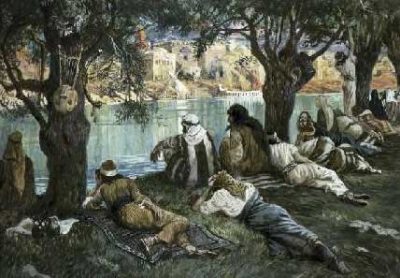Liturgical Readings for : Monday, 4th March, 2024
Monday, Third Week in Lent
Just as Naaman learned to do God’s will, so also with us.
Jesus emphasises salvation is a gift of God, but also the value of every act of love and obedience to his Father.
Memorial may be made of St Casimir
FIRST READING
A reading from the second book of Kings 5:1-15
There were many lepers in Israel, but none were cured except the Syrian, Naaman.
Naaman, army commander to the king of Aram, was a man who enjoyed his master’s respect and favour, since through him the Lord had granted victory to the Aramaeans. But the man was a leper. Now on one of their raids, the Aramaeans had carried off from the land of Israel a little girl who had become a servant of Naaman’s wife. She said to her mistress,
‘If only my master would approach the prophet of Samaria. He would cure him of his leprosy.’
Naaman went and told his master.
‘This and this‘ he reported ‘is what the girl from the land of Israel said.’
‘Go by all means,’ said the king of Aram ‘I will send a letter to the king of Israel.’
So Naaman left, taking with him ten talents of silver, six thousand shekels of gold and ten festal robes.
He presented the letter to the king of Israel. It read:
‘With this letter, I am sending my servant Naaman to you for you to cure him of his leprosy.’
When the king of Israel read the letter, he tore his garments.
‘Am I a god to give death and life,’ he said ‘that he sends a man to me and asks me to cure him of his leprosy? Listen to this, and take note of it and see how he intends to pick a quarrel with me.’

When Elisha heard that the king of Israel had torn his garments, he sent word to the king,
‘Why did you tear your garments? Let him come to me, and he will find there is a prophet in Israel.‘
So Naaman came with his team and chariot and drew up at the door of Elisha’s house. And Elisha sent him a messenger to say,
‘Go and bathe seven times in the Jordan, and your flesh will become clean once more.’
But Naaman was indignant and went off, saying,
‘Here was I thinking he would be sure to come out to me, and stand there, and call on the name of the Lord his God, and wave his hand over the spot and cure the leprous part. Surely Abana and Pharpar, the rivers of Damascus, are better than any water in Israel? Could I not bathe in them and become clean?‘
And he turned round and went off in a rage.
But his servants approached him and said,
‘My father, if the prophet had asked you to do something difficult, would you not have done it? All the more reason, then, when he says to you, “Bathe, and you will become clean”.’
So he went down and immersed himself seven times in the Jordan, as Elisha had told him to do. And his flesh became clean once more like the flesh of a little child.
Returning to Elisha with his whole escort, he went in and stood before him.
‘Now I know’ he said ‘that there is no God in all the earth except in Israel. Now, please, accept a present from your servant.’
The Word of the Lord. Thanks be to God
Responsorial Psalm Ps 41
Response My soul is thirsting for God, the God of my life;
when can I enter and see the face of God?

1. Like the deer that yearns for running streams,
so my soul is yearning for you, my God. Response
2. My soul is thirsting for God, the God of my life;
when can I enter and see the face of God? Response
3. O send forth your light and your truth; let these be my guide.
Let them bring me to your holy mountain to the place where you dwell. Response
4. And I will come to the altar of God, the God of my joy.
My redeemer, I will thank you on the harp, O God, my God. Response
Gospel Acclamation 2 Cor 6:2
Praise and honour to you, Lord Jesus!
Now is the favourable time; this is the day of salvation.
Praise and honour to you, Lord Jesus!
or Ps 129:5.7.
Praise and honour to you, Lord Jesus!
My soul is waiting for the Lord; I count on his word,
because with the Lord, there is mercy and fullness of redemption.
Praise and honour to you, Lord Jesus!
GOSPEL
The Lord be with you. And with your spirit
A reading from the holy Gospel according to Luke 4:24-30 Glory to you, O Lord
Like Elijah and Elisha, Jesus was not sent to the Jews only.
Jesus came to Nazara and spoke to the people in the synagogue:
‘I tell you solemnly, no prophet is ever accepted in his own country.
‘There were many widows in Israel, I can assure you, in Elijah’s day, when heaven remained shut for three years and six months and a great famine raged throughout the land, but Elijah was not sent to any one of these: he was sent to a widow at Zarephath, a Sidonian town.
And in the prophet Elisha’s time there were many lepers in Israel, but none of these was cured, except the Syrian, Naaman.’
When they heard this everyone in the synagogue was enraged. They sprang to their feet and hustled him out of the town; and they took him up to the brow of the hill their town was built on, intending to throw him down the cliff, but he slipped through the crowd and walked away.
The Gospel of the Lord. Praise to you, Lord Jesus Christ.
********************
Gospel Reflection Mon. Third Week of Lent Luke 4:24-30
It is said in today’s gospel reading that in response to Jesus’ preaching in Nazareth ‘everyone in the synagogue was enraged’. What was it that enraged people so much? Jesus had the nerve to suggest that God was as concerned with the enemies of Israel as with the people of Israel. Jesus identifies himself with Elijah when he was sent to minister to a widow of a town near Sidon in Phoenicia and with Elisha when he ministered to a commander in the Syrian army. The Phoenicians and the Syrians were perceived by the people of Israel as enemies because of the past history of the relationship between them and Israel. It can be very dangerous to speak well of enemies, especially in time of war.
The great anger that Jesus generated has been replicated all through history by those who have tried to show that life is more complex, less black and white, than we may think. Jesus was revealing to the people of Nazareth that God was not a national God, fighting on the side of Israel against everyone else. Rather, the heart of God embraced all humanity, and he was as concerned for widows in Phoenicia as for widows in Israel and for lepers in Syria as for lepers in Israel. God sent his Son to show the length and breadth and depth and height of God’s love, a love that surpasses knowledge, in the language of Saint Paul (Eph 3:19). It is very tempting to make God in our own image, our own personal image or our own image as a nation. Jesus reveals a God who has no favourites. He cares for the suffering and broken of the world, regardless of where they live or what their nationality. Jesus has sent the Spirit of God, the Holy Spirit, into our lives, so that we may be empowered to love others with the all-inclusive, non-discriminatory, love of God that Jesus revealed to the full by his teaching, his life, his death and resurrection.
________________________________
The Scripture Readings are taken from The Jerusalem Bible, published 1966 by Darton, Longman & Todd Ltd.













